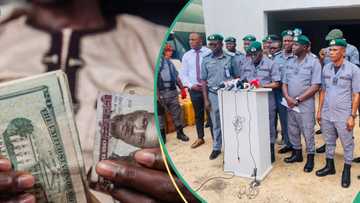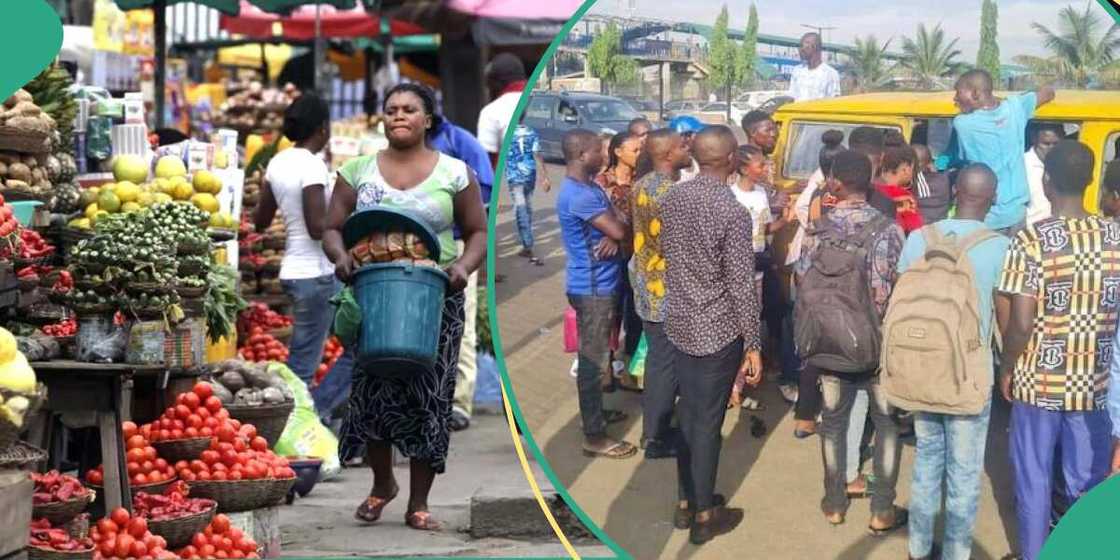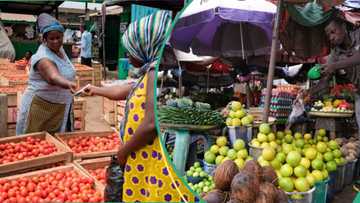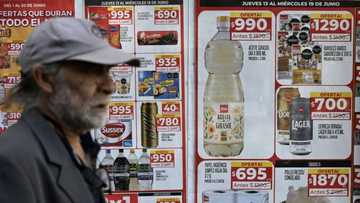Higher Food, Rent, Transport Prices Force Nigeria's Inflation Rate to Hit 33.95 Per Cent
- Once again, Nigeria's inflation rate has moved upward from last month's percentage point, given no sign of a reduction anytime soon
- According to the NBS report, the key areas responsible for the increase include food, non-alcoholic beverages, housing and electricity
- Legit.ng expert said that the rising inflation rate erodes purchasing power, exacerbates poverty, and hampers economic growth
PAY ATTENTION: Legit.ng Entertainment Awards 2024 Voting Is Alive. Choose the best entertainer in 15 categories for FREE.
Legit.ng journalist Victor Enengedi has over a decade's experience covering Energy, MSMEs, Technology and the stock market.
As evidenced by the rising cost of goods and services, Nigeria's inflation rate rose to 33.95% in May 2024, according to the latest report by the National Bureau of Statistics (NBS).
According to the NBS Consumer Price Index report published on Saturday, June 15, this marks a 0.26% increase from the April 2024 headline inflation rate of 33.69%.

Read also
CBN reduces Customs exchange rate to clear goods at ports, airports after Eid-el-Kabir holidays

Source: UGC
Consistent inflation rate increases
The data shows that on a year-on-year basis, the headline inflation rate was 11.54% higher than the 22.41% recorded in May 2023.
PAY ATTENTION: Сheck out news that is picked exactly for YOU ➡️ find the “Recommended for you” block on the home page and enjoy!
This indicates a significant increase in the year-on-year headline inflation rate from May 2023 to May 2024.
However, on a month-on-month basis, the headline inflation rate for May 2024 was 2.14%, a 0.15 percentage point decrease from the 2.29% recorded in April 2024.
According to the NBS, this means that the rate of increase in average prices in May 2024 was lower than that of April 2024.
The main drivers of headline inflation in May 2024 were food and non-alcoholic beverages at 17.59%, housing, water, electricity, gas, and other fuels at 5.68%, while clothing and footwear stood at 2.60%.
Other contributors include transport at 2.21%, furnishings, household equipment, and maintenance at 1.71%, education at 1.34%, health at 1.02%, miscellaneous goods and services at 0.56%, restaurants and hotels at 0.41%, alcoholic beverages, tobacco, and kola at 0.37%, recreation and culture at 0.23%, and communication at 0.23%.
The contributions of items on the divisional level to the increase in the headline inflation index are presented below:
| No | Item | % Contribution |
| 1 | Food and non-alcoholic beverages | 17.59 |
| 2 | Housing, water, electricity, gas, and other fuels | 5.68 |
| 3 | Clothing and footwear | 2.60 |
| 4 | Transport | 2.21 |
| 5 | Furnishings, household equipment, and maintenance | 1.71 |
| 6 | Education | 1.34 |
| 7 | Health | 1.02 |
| 8 | Miscellaneous goods and services | 0.56 |
| 9 | Restaurants and hotels | 0.41 |
| 10 | Alcoholic beverages, tobacco and kola | 0.37 |
| 11 | Recreation and culture | 0.23 |
| 12 | Communication | 0.23 |
Food inflation skyrockets to 40%
The NBS report also highlighted that the food inflation rate in May 2024 was 40.66% on a year-on-year basis, which is 15.84% higher than the 24.82% recorded in May 2023.
The rise in food inflation was attributed to increased prices of several items, including Semovita, Oatflake, Yam flour prepackaged, and Garri, all of which fall under the Bread and Cereals category.
Other contributing items included Irish potatoes, yam, and water yam (from the Potatoes, Yam, and Other Tubers category), palm oil and vegetable oil (under the Oils and Fats category), stockfish, mudfish, and crayfish (under the Fish category), as well as beef head, live chicken, pork head, and bush meat (under the Meat category).
Background to Nigeria's rising inflation
In recent years, food prices in Nigeria have surged as insecurity in several farming states, including Benue, Plateau, and Kaduna, has forced farmers to abandon their land.
The situation worsened last year when the Bola Tinubu administration removed petrol subsidy, affecting many Nigerians who rely on petrol for their vehicles and electricity generators.
Additionally, the government floated the naira to align the official exchange rate with the black market rate.
Nigeria's naira has plummeted to unprecedented lows in both the official and unofficial markets due to heightened forex demand and rising prices of goods and services nationwide.
In response, the Nigerian government has introduced measures and reforms to protect the foreign exchange market and counter speculative activities.
To address the rising inflation, the Central Bank of Nigeria (CBN) increased the interest rate by 150 basis points, from 24.75% to 26.25%, during its Monetary Policy Committee meeting in May.
This marks the third consecutive increase in the Monetary Policy Rate (MPR), although it has yet to halt the surging inflation rate.
Rising inflation calls for action
Reacting to the recent NBS report, Dr Ifeanyi Ubah, an economist told Legit.ng that Nigeria's rising inflation rate has become a significant concern, impacting the country's economic stability and the daily lives of its citizens.
He said:
"Driven by factors such as fluctuating oil prices, currency devaluation, and supply chain disruptions, inflation has led to soaring costs of goods and services.
"This escalation erodes purchasing power, exacerbates poverty, and hampers economic growth.
"Policymakers must address these underlying issues through fiscal discipline, economic diversification, and targeted social interventions."
He added that swift action is crucial to mitigating the adverse effects on Nigeria's populace and fostering a more resilient and balanced economy in the long term.
Six cheap foods now unaffordable to Nigerians
In a related story, Legit.ng reported that some formerly cheap food items are no longer affordable to average Nigerian homes.
According to a market survey undertaken by Legit.ng, food product prices have doubled in recent months.
The continuous rise in the costs of these staple foods, alongside other commodities, has reduced Nigerians' buying capacity, as many find it challenging to meet their daily dietary needs.
Proofreading by James Ojo Adakole, journalist and copy editor at Legit.ng.
PAY ATTENTION: Stay Informed and follow us on Google News!
Source: Legit.ng







